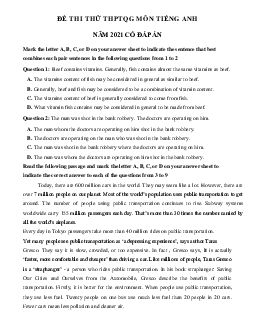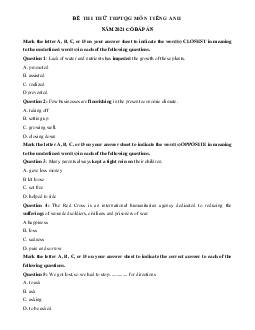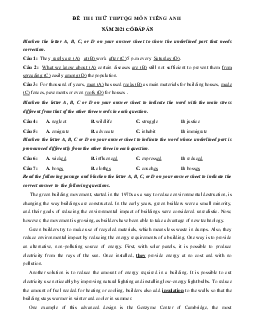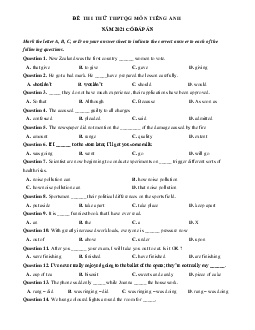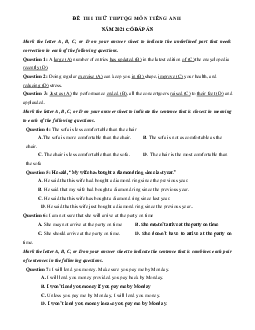







Preview text:
ĐỀ THI THỬ THPTQG MÔN TIẾNG ANH
NĂM 2021 CÓ ĐÁP ÁN
Mark the letter A, B, C, or D on your answer sheet to indicate the word whose underlined
part differs from the other three in pronunciation in each of the following questions. Câu 1 (NB): A. swear B. spear C. hear D. shear Câu 2 (NB): A. eased B. missed C. ceased D. lapsed
Mark the letter A, B, C, or D on your answer sheet to indicate the word that differs from
the other three in the position of primary stress in each of the following questions.
Trả lời cho các câu 3, 4 dưới đây: Câu 3 (NB): A. emphasize B. determine C. educate D. compliment Câu 4 (NB): A. attempt B. effort C. action D. product
Mark the letter A, B, C, or D on your answer sheet to indicate the correct answer to each
of the following questions.
Câu 5 (TH): In general, _______, the higher your risk of getting and spreading COVID-19.
A. the many people you interact with
B. the more people you interact with C. the
people you interact more with
D. the more many people you interact with
Câu 6 (VD): I'm not blaming you - we all ______ mistakes. A. get B. make C. take D. earn
Câu 7 (TH): Nam is motivated to study ______ he knows that a good education can improve his life. A. so that B. so C. because D. therefore
Câu 8 (VDC): My sister is feeling unwell. That's why she is eating like a ______ today. A. tiger B. chicken C. bird D. horse
Câu 9 (TH): Over 200 people attended the ceremony; many of ______ had known Steve as their teacher. A. which B. whose C. whom D. that
Câu 10 (VDC): It's unlikely that he will win, ______? A. is it B. isn't it C. won't he D. will he
Câu 11 (VD): ______, she received a big applause.
A. Once finishing her lecture
B. When the speaker finishes
C. Speaking has finished
D. After she finishes speaking
Câu 12 (TH): Many factories dispose of their waste by ______ it into rivers and the sea. A. blowing B. pumping C. jumping D. flowing
Câu 13 (TH): In a formal interview, it is essential to maintain good eye contact ______ the interviewers. A. for B. on C. with D. at
Câu 14 (NB): If he didn't have to work today, he ______ his children to the zoo. A. will take B. takes C. would take D. has taken
Câu 15 (VD): She was a ______ woman.
A. young, beautiful, thin, tall, Vietnamese B. beautiful, tall, thin, young, Vietnamese
C. young, beautiful, tall, thin, Vietnamese D. beautiful, young, tall, thin, Vietnamese
Câu 16 (VD): Whenever a problem ______, we try to discuss frankly and find solutions as soon as possible. A. comes in B. comes by C. comes over D. comes up
Câu 17 (VD): If we want to develop inner tranquility, we have to stop ______ by every little thing. A. to bother B. bothering
C. to be bothered D. being bothered
Câu 18 (TH): Tim's encouraging words gave me ______ to undertake the task once again. A. a point
B. an incentive C. a job D. a letter
Câu 19 (TH): In the past people believed that women's ______ roles were as mothers and wives. A. nature
B. naturalizing C. naturally D. natural
Mark the letter A, B, C, or D on your answer sheet to indicate the word(s) CLOSEST in
meaning to the underlined word(s) in each of the following questions.
Câu 20 (TH): My sister said that the journey by sea was long and boring. However, I found it very interesting. A. route B. flight C. voyage D. excursion
Câu 21 (TH): My parents' warnings didn't deter me from choosing the job of my dream. A. influence B. inspire C. reassure D. discourage
Mark the the letter A, B, C, or D on your answer sheet to indicate the word(s) OPPOSITE
in meaning to the underlined word(s) in each of the following questions.
Câu 22 (TH): My neighbor is a reckless driver. He has been fined for speeding and has his
license suspended for 3 months. A. famous B. enormous C. dangerous D. cautious
Câu 23 (VDC): The Covid – 19 pandemic has taken a heavy toll on the economy of many countries. A. put blame
B. exerted a small pressure
C. had little impact D. been a slight loss
Mark the letter A, B, C, or D on your answer sheet to indicate the option that best
completes each of the following exchanges.
Câu 24 (TH): George and Ben are talking about their hobbies.
- George: “In my opinion, action films are exciting.” - Ben: “______”
A. What is opinion!
B. There's no doubt about it.
C. Yes, you can do it.
D. Your opinion is exactly.
Câu 25 (TH): John is inviting Tom to have a get-together next week.
- John: “Would you like to have a get-together with us next weekend?”
- Tom: “_______________.”
A. Yes, we would B. No, I won't
C. Yes, I'd love to D. No, I wouldn't
Read the following passage and mark the letter A, B, C, or D on your answer sheet to
indicate the correct word or phrase that best fits each of the numbered blanks from 25 to 29.
People born in different ages are different from each other in various aspects. The world is (26)
______ at a rapid pace and thus the difference between people born in different times is
inevitable. Generation gap is the term given to the difference between two generations. The
society changes at a constant pace and hence the lifestyle, ideologies, opinions, beliefs and the
overall behavior of people also (27) ______ change with time. This change gives way to newer
ideas and breaks the unreasonable stereotypes and this in turn has a positive (28) ______ on the
society. (29) ______, most of the times it becomes a cause of conflict between two generations.
The parent child relationship is often affected due to their generation gap. It has been observed
that the parents try to impose their values and ideologies on their kids while the later want to
explore the world on their own. Many relationships have suffered due to generation gap.
Several parents and children have conflicts because of their difference of opinions (30) ______
they must understand is natural as there is a generation gap between them. Câu 26 (TH): A. change B. changed C. changeable D. changing Câu 27 (VD): A. undergoes B. continues C. suffers D. overcomes Câu 28 (TH): A. agreement B. impact C. ban D. debate Câu 29 (TH): A. Therefore B. Otherwise C. Moreover D. However Câu 30 (NB): A. when B. which C. why D. who
Read the following passage and mark the letter A, B, C, or D on your answer sheet to
indicate the correct answer to each of the questions from 31 to 35.
One of the greatest security threats in the online world is computer hacking. Hackers are people
who illegally enter systems. They may alter or delete information, steal private information, or
spread viruses that can damage or destroy files. But how exactly can a hacker get into a system to do these things?
Most hackers use information called protocols that are built into computer software. These
protocols allow computers to interact with one another. Protocols are sort of like computer
police officers. When a computer connects to another system, the protocols check to see if the
access is valid. The protocols can also determine how much information can be shared between
the two systems. Hackers can manipulate the protocols to get unlimited access to a computer system.
In fact, just the act of entering a computer network is commonly considered passive hacking.
Passive hackers get a rush from just being able to access a challenging system like a bank or
military network. Another kind of hacker tries to do damage to a system. After hacking into
systems, these hackers release viruses or alter, delete, or take information. Known as active
hackers, they are the more dangerous of the two.
The easiest way to protect a system is with a good password. Long and unusual passwords are
harder for hackers to guess. For even greater security, some online services now use “password-
plus” systems. In this case, users first put in a password and then put in a second code that
changes after the user accesses the site. Users either have special cards or devices that show
them new code to use the next time. Even if a hacker steals the password, they won’t have the
code. Or if the hacker somehow gets the code, they still don’t know the password.
Câu 31 (VD): What should be the main title of the passage?
A. Hackers and Computer Security
B. Funny Things Hackers Do
C. Famous Hackers
D. Good Ways to Stop Hackers
Câu 32 (TH): The word "valid" in paragraph 2 is closest in meaning to __________. A. easy B. expensive C. acceptable D. free
Câu 33 (NB): The word "They” in paragraph 1 refers to __________. A. People B. Hackers C. Systems D. Computers
Câu 34 (VD): What do hackers do to get into a computer?
A. spreading viruses
B. changing security programs
C. making a new password D. manipulating codes
Câu 35 (VD): Why are active hackers probably considered more dangerous than passive ones?
A. active hackers are more skilled. B. passive hackers have more intense personalities.
C. active hackers do damage.
D. passive hackers are caught more easily.
Read the following passage and mark the letter A, B, C, or D on your answer sheet to
indicate the correct answer to each of the questions from 36 to 42.
It is estimated that by 2050 more than two-thirds of the world's population will live in cities, up
from about 54 percent today. While the many benefits of organized and efficient cities are well
understood, we need to recognize that this rapid, often unplanned urbanization brings risks of
profound social instability, risks to critical infrastructure, potential water crises and the potential
for devastating spread of disease. These risks can only be further exacerbated as this
unprecedented transition from rural to urban areas continues.
How effectively these risks can be addressed will increasingly be determined by how well
cities are governed. The increased concentration of people, physical assets, infrastructure and
economic activities mean that the risks materializing at the city level will have far greater
potential to disrupt society than ever before.
Urbanization is by no means bad by itself. It brings important benefits for economic, cultural
and societal development. Well managed cities are both efficient and effective, enabling
economies of scale and network effects while reducing the impact on the climate of
transportation. As such, an urban model can make economic activity more environmentally-
friendly. Further, the proximity and diversity of people can spark innovation and create
employment as exchanging ideas breeds new ideas.
But these utopian concepts are threatened by some of the factors driving rapid urbanization.
For example, one of the main factors is rural-urban migration, driven by the prospect of greater
employment opportunities and the hope of a better life in cities. But rapidly increasing
population density can create severe problems, especially if planning efforts are not sufficient to
cope with the influx of new inhabitants. The result may, in extreme cases, be widespread
poverty. Estimates suggest that 40% of the world's urban expansion is taking place in slums,
exacerbating socio-economic disparities and creating unsanitary conditions that facilitate the spread of disease.
The Global Risks 2015 Report looks at four areas that face particularly daunting challenges in
the face of rapid and unplanned urbanization: infrastructure, health, climate change, and social
instability. In each of these areas we find new risks that can best be managed or, in some cases,
transferred through the mechanism of insurance.
Câu 36 (NB): The word “that" in paragraph 4 refers to __________.
A. urban expansion
B. socio-economic disparities C. disease
D. unsanitary conditions
Câu 37 (TH): According to paragraph 3, what is one of the advantages of urbanization?
A. It minimizes risks for economic, cultural and societal development.
B. It makes water supply system both efficient and effective.
C. Weather and climate in the city will be much improved.
D. People may come up with new ideas for innovation.
Câu 38 (VD): Which statement is TRUE, according to the passage?
A. Urbanization brings important benefits for development as well.
B. 54% of the world's population will live in cities by 2050.
C. Risks cannot be addressed effectively no matter how well cities are governed.
D. Rapidly increasing population density can help solve poverty.
Câu 39 (VD): The word "addressed" in paragraph 2 is closest in meaning to _________. A. aimed at B. dealt with C. added to D. agreed on
Câu 40 (VDC): What can be inferred from the passage?
A. Poverty may be a foregone conclusion of unplanned urbanization.
B. Diseases are caused by people migrating to cities.
C. Urbanization can solve the problem of environmental pollution in cities.
D. The increasing number of people in cities can create more employment.
Câu 41 (VD): Which is the most suitable title for the passage?
A. The Risks of Rapid Urbanization in Developing Countries
B. Infrastructure and Economic Activities in Cities
C. The Global Risks 2015 Report on Developing Urban Areas
D. Rapid Urbanization Put Cities in Jeopardy
Câu 42 (VD): The word “spark” in paragraph 3 is closest in meaning to ___________. A. need B. start C. encourage D. design
Mark the letter A, B, C, or D on your answer sheet to indicate the underlined part that
needs correction in each of the following questions.
Câu 43 (TH): If a patient has (A) a special medical condition such as diabetes, epilepsy, or
allergy, it is advisable that it (B) carry some kind (C) of identification in order to avoid being
given improper medication (D) in an emergency. A. has B. it C. kind D. medication
Câu 44 (VD): To avoid (A) confusion, the two (B) never wear (C) the same (D) clothes. A. To avoid B. two C. wear D. same
Câu 45 (TH): I will (A) tell you something interesting (B) when I will have come (C) back
from (D) the holiday. A. will B. interesting
C. will have come D. from
Mark the letter A, B, C, or D on your answer sheet to indicate the sentence that is closest
in meaning to each of the following questions.
Trả lời cho các câu 46, 47, 48 dưới đây:
Câu 46 (VD): You were expected to answer all the questions on the exam paper but you didn't.
A. Contrary to our expectation, you answered all the questions on the exam paper.
B. You should have answered all the questions on the exam paper.
C. You didn't answer all the questions on the exam paper and it was necessary.
D. You didn't have to answer all the questions on the exam paper as we had expected.
Câu 47 (VDC): Julie to her neighbor: “Oh, it wasn't me who started that ugly rumor about you.”
A. Julie confessed to starting an ugly rumor about her neighbor.
B. Julie refused to start an ugly rumor about her neighbor.
C. Julie denied having started an ugly rumor about her neighbor.
D. Julie admitted having started an ugly rumor about her neighbor.
Câu 48 (VD): I started working in this company when I came back from Japan.
A. When I worked in this company, I started coming back from Japan.
B. As soon as came back from Japan, I applied for this company.
C. I haven't come back Japan since I started working in this company.
D. I have been working in this company since I came back from Japan.
Mark the letter A, B, C, or D on your answer sheet to indicate the sentence that best
combines each pair of sentences in the following questions.
Câu 49 (VDC): My wife didn't leave the car keys. I couldn't pick her up at the station.
A. Were my wife to leave the car keys, I could pick her up at the station.
B. Not until I found the car keys that my wife had left, I could pick her up at the station.
C. Had my wife left the car keys, I could have collected her at the station.
D. Only when my wife left the car keys could I pick her up at the station.
Câu 50 (VDC): After he had finished the report, he submitted it to the director.
A. Finishing the report, it was submitted to the director.
B. Having finished the report, he submitted to the director.
C. Having finished the report, he submitted it to the director.
D. Having finished the report, it was submitted to the director. Đáp án 1-A 2-A 3-B 4-A 5-B 6-B 7-C 8-C 9-C 10-D 11-A 12-B 13-C 14-C 15-D 16-D 17-D 18-B 19-D 20-C 21-D 22-D 23-D 24-B 25-C 26-D 27-A 28-B 29-D 30-B 31-A 32-C 33-B 34-D 35-C 36-D 37-D 38-B 39-B 40-A 41-A 42-B 43-B 44-B 45-C 46-B 47-C 48-D 49-D 50-C
